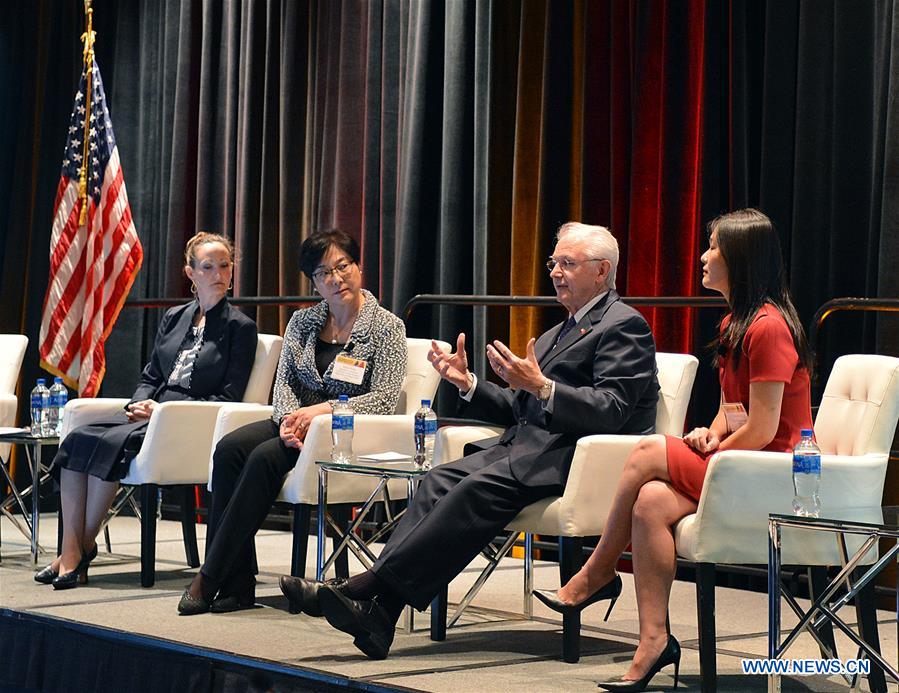
Bob Holden (2nd R), chairman and CEO of the United States Heartland China Association and former Missouri Governor, attends a panel discussion on education and cultural exchange during the Fifth China-U.S. Governors Forum held in the U.S. state of Kentucky on May 23, 2019. America's heartland, the seat of the U.S. agricultural economy, has been badly hit by the country's trade dispute with China, Holden said, urging the two sides to reach a win-win agreement soon. (Xinhua/Li Rui)
by Xinhua writers Xiong Maoling and Liu Yang
LEXINGTON, the United States, May 24 (Xinhua) -- America's heartland, the seat of the U.S. agricultural economy, has been badly hit by the country's trade dispute with China, former Missouri Governor Bob Holden said, urging the two sides to reach a win-win agreement soon.
Eighteen out of the 20 U.S. states located between the Great Lakes and the Gulf of Mexico are "the hardest hit" by tariffs stemming from the U.S.-China trade dispute, Holden, chairman and CEO of the United States Heartland China Association, told Xinhua.
"There's a great deal of concern, uneasiness" from soybean producers in Missouri and some other agricultural areas, Holden said on the sidelines of the Fifth China-U.S. Governors Forum held in the U.S. state of Kentucky.
"The thing with farming, it is a cyclical process," Holden said. "If you leave the soybeans on the field until they rot, you get no benefit out of them."
Holden, whose organization is committed to building stronger ties between the 20 U.S. states -- which include Tennessee, Missouri, Iowa, Nebraska, Illinois, Texas and Oklahoma -- and China, said "we've got a very sincere interest in getting this resolved ... so we can get back to work."
To reach a trade agreement, the former Missouri governor said the two sides are "going to have to feel like they both gave something and they both gained something from it."
"They've got to look at it from the standpoint that what can we do and what can they do to both serve our self-interest and not undermine the credibility of the other," he said.
The three-day forum, which kicked off Wednesday, features dialogues on business, culture, education and other issues.
Despite the trade dispute, Holden said "there is a tremendous amount of interest from the local level in figuring out how we bring these two cultures together to work on behalf of both."
Holden, who has traveled to China about 15 times, said what struck him most is the people he met in China, who are "wonderful people, family people, who want their children to have a better opportunity than they have, which is the very same value system that we have in the middle part, the heartland of the United States."
Holden helped bring the first Confucius Institute to the state of Missouri when he was a professor at Webster University.
He highlighted the importance of U.S.-China cooperation on education and culture, saying that "it's my contention that how well you put together the cultural relationships, how well you build the education partnerships, will determine how successful you're going to be in the business department."
Noting that he got "uneasy feelings" about what he saw in the political world, Holden said if cultural and educational aspects of the two countries could be mobilized, "they will be the driving force in making changes."
"Education is at the center of what we do," Holden said, adding that his organization has been helping establish connections between academic institutions of the two countries.
"It's important that we continue to look at ways to connect our educational system, our students with the students from China so that they can, at a young age, get to understand both cultures," he said.
Holden opened Missouri's first trade office in China during his term from 2001 to 2005. The former Missouri governor has seen new opportunities for cooperation between America's heartland and China, such as energy and infrastructure.
"We're also working with mayors throughout the 20-state region and governors throughout the 20-state region on building those relationships," he said.











